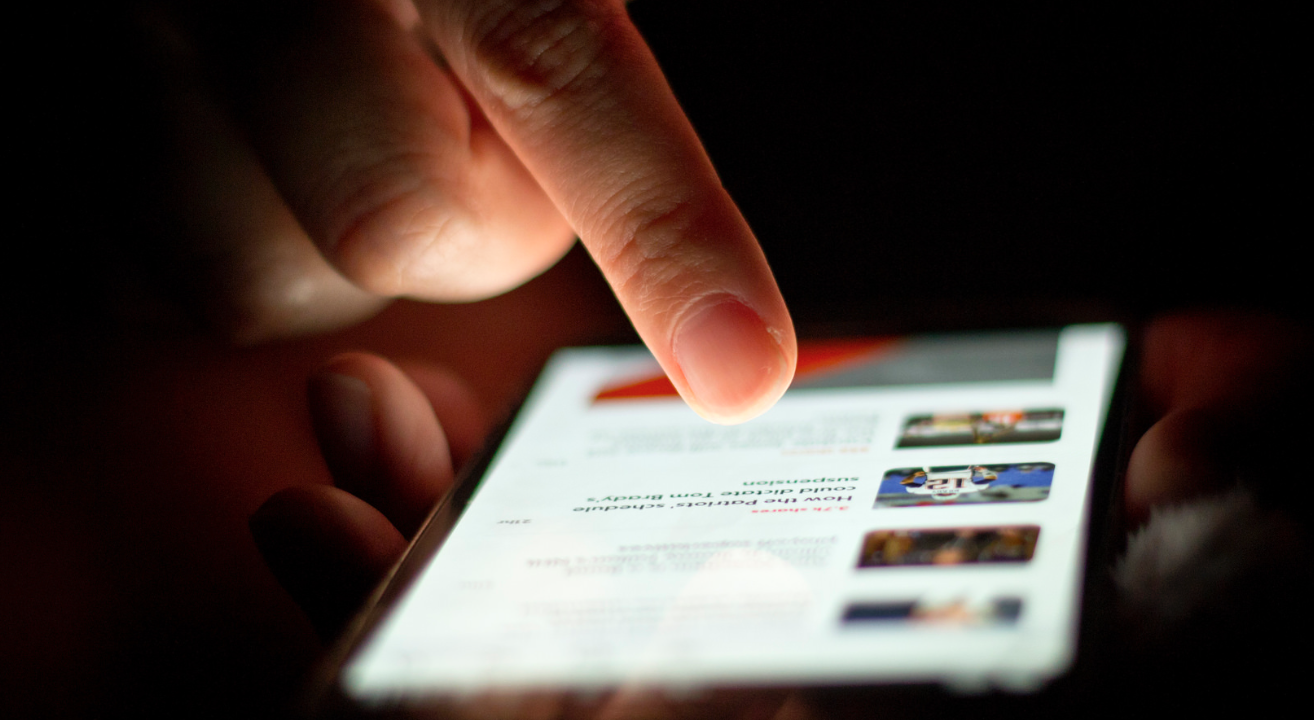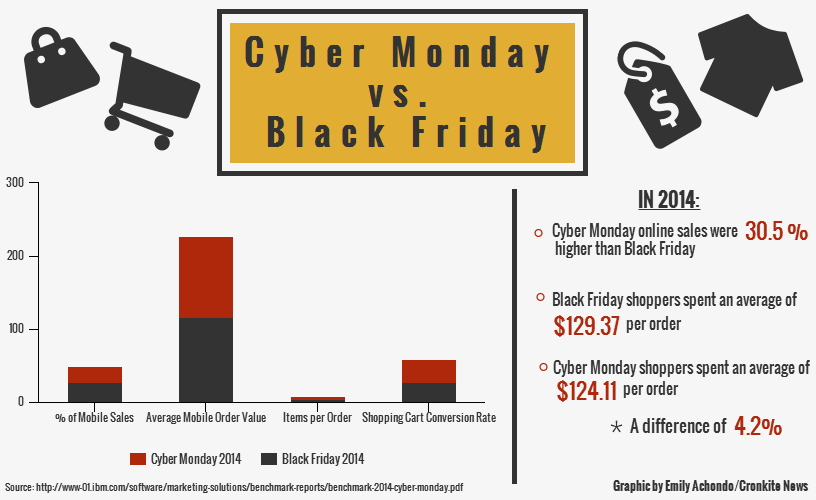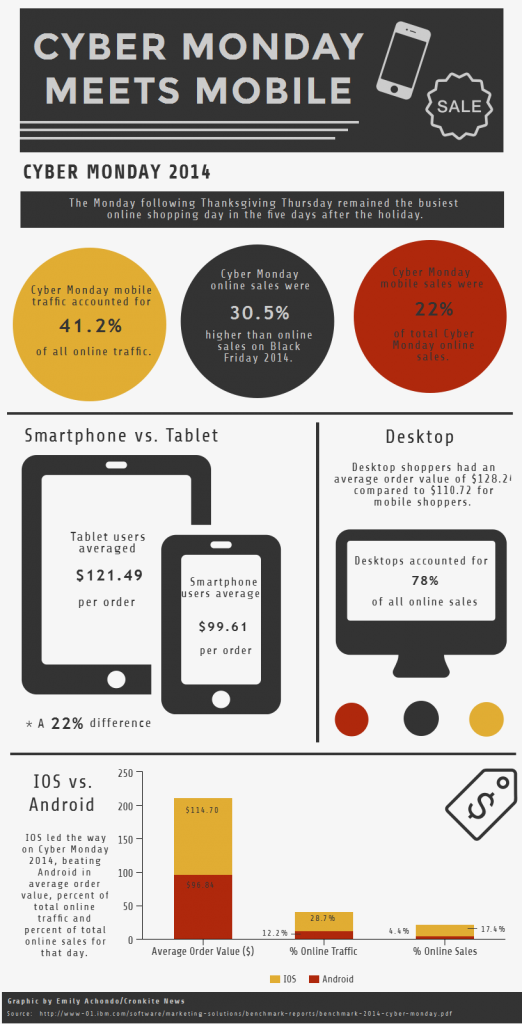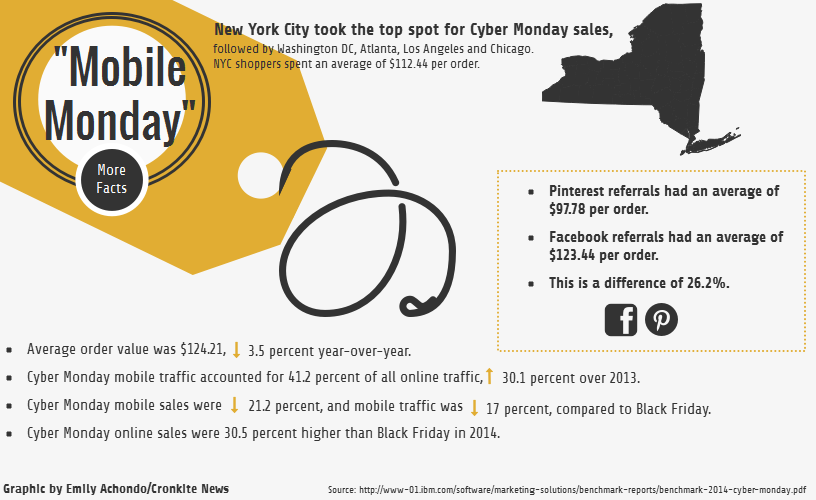FYI: Cyber Monday Becoming More Mobile, Data Shows

By Emily Achondo | Cronkite News |
Thanksgiving Thursday. Black Friday. Small Business Saturday. Cyber Monday. These days mark some of the busiest shopping times of the year.
With retailers opening their doors earlier every year, many people flock to stores, like Target, starting on Thanksgiving Day to get the best deals and discounts.
But shoppers don’t have to leave the comfort of their homes to get Cyber Monday deals. They just have to make sure their mobile device has a full battery.
According to a 2014 IBM retail report, Cyber Monday continues to grow in both online sales and in mobile sales.
In fact, mobile sales accounted for 22 percent of all Cyber Monday online sales in 2014, according to the report.
Also, Cyber Monday mobile traffic accounted for 41.2 percent of all online traffic, an increase of 30.1 percent from 2013, in 2014, IBM reported.
Apps for mobility
According to Anita Bhappu, associate professor of retailing and consumer sciences at the University of Arizona, the shift toward the mobile platform for online shopping can primarily be attributed to the number of mobile devices that people have available to them.
“Well I think the shift to mobile shopping is just a reflection of the increasing amount of mobile smartphones and devices now that consumers have in their possession,” she said. “So I think it’s highly correlated with just technology adoption of the platform in and of itself.”
Bhappu also said the draw to mobile shopping is a result of an effort of retailers to cater specifically to mobile, especially through mobile apps.
“Just the rise in the amount of apps, right, so mobile apps that are available to consumers from retailers, that’s definitely been something that has propelled mobile sales because if you look back three to five years there would have been very few retailers with mobile apps,” Bhappu said. “As a technology platform itself has expanded, then that created both the impetus and the desire to reach consumers through that technology channel and provided the motivation and all the justification for investment in those types of developed software.”
In addition to the creation of mobile apps, Bhappu said the rise in mobile shopping on Cyber Monday has been the result of efforts by retailers to attract costumers who have mobile devices even if they happen to be shopping in the physical store locations.
“I think the other side to it is not just the app but also the really the strategic investment within the store not just online or through the eCommerce channel but on the part of retailers to engage consumers who have mobile devices to shop and learn about what is available in store,” she said. “Even within the store, that mobile app provides a way for retailers, for example, to deliver personalized coupons.”
John Eaton, clinical professor in the department of marketing in the W.P. Carey School of Business at Arizona State University, also said a mobile Cyber Monday has evolved out of advances in technology, and as people use their mobile devices more, retailers are responding to the wants of the customer.
“What (retailers) are doing is obviously realizing that people are using their smartphones much like we used to use computers,” Eaton said. “The technology is so great that we have this ability really to carry around major computers in the guise of a smartphone. So we’re watching consumers evolve to that and then retailers, of course, are trying to go where consumers are, which means we’re doing much more on our smartphones.”
As a result, the Cyber Monday shopping experience has evolved because mobile shopping, especially through apps, now eliminates the craze that has become associated with holiday-shopping days like Black Friday, according to Eaton.
And while marketing has brought awareness to the mobility of Cyber Monday, the convenience of mobile shopping is more of an explanation for the shift to mobile, Eaton said.
“Marketing is great for creating awareness and hopefully creating some attention,” he said. “But if it didn’t solve a problem, if it didn’t make it easier for me to buy online, if that wasn’t easier than me going to the store, then it wouldn’t gain traction. It wouldn’t continue to be a thing.”
Devices
When it comes to which type of mobile device shoppers are gravitating to for their Cyber Monday shopping, IBM reported that smartphones drove traffic and tablets drove sales in 2014.
Smartphones accounted for 28.5 percent of all Cyber Monday online traffic compared with tablets, which accounted for 12.5 percent of online traffic, according to the report.
However, tablets won out in terms of sales, where 12.9 percent of online sales were made on tablets compared with 9.1 percent of mobile sales made on smartphones, according to IBM.
These numbers do not come as a surprise to Bhappu, however, given the function and purpose associated with the different types of mobile devices.
“The data I’ve read about tablet versus phone usage suggests that when you’re in you’re home and you’re shopping, you’re more likely to use a tablet because it’s, one a bigger interface,” Bhappu said. “It’s also more interactive if it’s more than one person shopping or talking about options. Whereas if you’re in the store shopping, then you’re more likely to use your phone because you don’t have your tablet.”
Which she said makes sense especially when it comes to Cyber Monday.
“If you think about Cyber Monday or you think about the sort of Thanksgiving holiday shopping spree, which Cyber Monday is now a part of, most of those purchases that are running through kind of an online interface are being done at home, and so I’m not surprised by the tablet usage being higher,” she said.
What’s next?
According to Eaton, Cyber Monday is just another an example of a trend. First, it was online shopping and that emerged from Black Friday. But as the shift to the Internet brought about Cyber Monday, the importance of Black Friday has decreased. And now, as part of that evolution, we see a shift from desktop and laptop shopping to mobile shopping on Cyber Monday.
“It’s an evolutionary process,” Eaton said. “The trend is that it pushes in a different direction for a while until something else comes along and does a better job of solving your problem, and clearly mobile and the ability to have that app and put in a wish list or put in and have it shared with friends online so they’re really buying you things that you would enjoy and access to that, I think that, obviously does a better job of solving problems.”

















